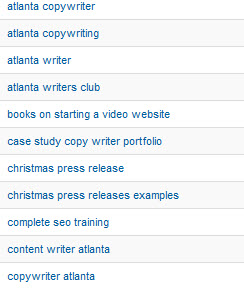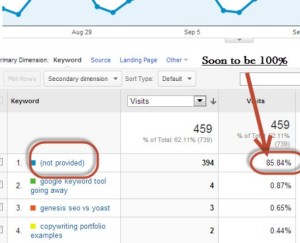 Do you remember that infamous line from Jurassic Park, “Hold on to your Butts”?
Do you remember that infamous line from Jurassic Park, “Hold on to your Butts”?
Yeah, that.
Google has changed things up again. And to say the SEO community is in an uproar about it is an understatement. It’s not pretty out there, people.
Google has decided to encrypt all search data, which will inevitably and quickly move everyone to 100% “not provided” keyword data. Do you remember all that beautiful, juicy data we’d be provided with in Google Analytics? For me, it’d go something like this:
Now, it’s something like this screenshot below where “not provided” has shot up to 85% and is steadily climbing up to 100%:
You don’t have to like it, but you do have to accept it and find a way to move on. While us SEO consultants and professionals are going to take the next few days and weeks to sort this out, in the meanwhile here are 3 things that might take the pain away from the new Google changes of seeing “100% not provided.”
- We can still see what pages are most popular (referred to as “Landing Pages”) in Google Analytics: And if you have a strategy by way of a keyword mapping spreadsheet, you know what keywords are driving traffic. If you’re not familiar with this concept and have just been winging it, let me know in the comments if you need further explanation around this.
- Google Webmaster Tools will continue to provide keyword terms, CTR, impressions and average ranking position. Every week I provide a report based on this data to my client on what long-tail keywords we have on Page 1. If you’re interested in learning how to do this, Flyte has a great tutorial (I’ll dig up their blog post and drop it here shortly).
- We can still check rankings manually. This is VERY dangerous, for reasons I provide below, but hear me out. Every week, I log out of Google and manually check rankings on my client’s top 20 keywords and provide a report. Yes, this is time consuming, but not only does this tactic provide a general benchmark of where we are ranking and how we are fluctuating, I see every week who my competition is, what new results are popping in from what companies, media outlets, or organizations, and I reset my content creation/linkbuilding strategy as needed. Providing a ranking report to clients is dangerous, because some clients get caught up on using this – and only this – to measure SEO effectiveness. They also might watch like a hawk every single time they slip a spot or two and get up in arms. It’s all about education, setting reasonable expectations, and choosing reasonable clients to work with (which I know is easier said than done, but not impossible).
This may be small consolation for the significant loss of precious data. But it could be all we have right now. If you don’t have a strategy or plan, and have been winging your SEO, then as the famous Samuel l Jackson says in Jurassic Park, “Hold on to your butts.”
Haters Gonna Hate
The backlash from the SEO community, SEO haters, and Google haters is not going to be pretty. What is ahead in the next few days?
- Google haters taking to the Internet crying foul
- SEO professionals lamenting the death of their jobs
- Google employees stating that they didn’t do this as a ploy to move companies towards advertising (uh huh)
I urge you, try not to get sucked in to the negativity and mob mentality. Ride the panic out, and I’ll see you on the other side.
Additional Reading on the Google Changes Going to 100% “Not Provided”:
- http://searchengineland.com/post-prism-google-secure-searches-172487
- http://searchengineland.com/googles-plan-to-withhold-search-data-create-new-advertisers-171205
- http://searchenginewatch.com/article/2296351/Goodbye-Keyword-Data-Google-Moves-Entirely-to-Secure-Search
- http://moz.com/blog/100-percent-keyword-not-provided-whiteboard-tuesday
- http://www.searchenginejournal.com/google-gone-100-provided-secure-search/70799/
- http://news.submitinme.com/newsdetails-366.aspx
- http://www.352media.com/blog/google-redirecting-to-https-goodbye-keyword-data-hello-new-kpis/
Let’s Discuss
Do you agree? Disagree? Hate the changes? Unlike other blogs where all the commenters do is rant, let’s turn this into a good community discussion on the impact of “100% not provided” and generate ideas on what we can do about it. Cool? You guys rock!
Leave your comments below
Jurassic Park Photo credit: Quickmeme.com
Jenny Munn
Latest posts by Jenny Munn (see all)
- Four 2024 SEO Planning Tips for World Domination - November 16, 2023
- SEO Planning Tip: Why You Need a CYA Clause - November 3, 2023
- How Long Does SEO Take to Show Results? (Updated for 2023) - August 9, 2023





7 Comments
Good thoughts! I was going to email you today to see what you had to say about it, but you beat me to it. 🙂
I’m not a fan of these moves, of course, but it’s not up to me. Rather than cry about how unfair it is, we need to dig in and figure out how best to cope with it. Your three items at the end are a great place to start.
@Mickey – you are my blog commenting hero. Holy moly, you’re fast! 🙂 I know, I’m not a fan either, but I’ve quickly learned that there is some mathematical equation around “the quicker you accept and ride out Google changes the more successful and sustainable you’ll be at SEO.” As I pick up great advice from other SEO professionals on how to cope I’ll post them here.
Thanks again, Mickey!
Hi Jenny-
I have been getting you emails for awhile and finally got arou d to visiting your site! I am so excited about your seo for beginners tab. We started our site in april and figured if we had great content things with Google would work themselves out. Worked great until sept 1. Then Google stopped sending traffic. I’m excited to see what I can do to help remedy this!
Hi Jenny,
You’re my hero! I already dreaded keyword research (I subcontract it out, then just do the writing), and am still not sure how I’m going to explain things to my clients moving forward. This is a big help!
By the way, is this the Flyte tutorial you mentioned?:
http://www.flyteblog.com/flyte/2013/02/how-to-connect-webmaster-tools-to-google-analytics.html
Hey Jenny,
Great article. I most liked how you urged marketing professionals to not immediately turn on the negativity faucet towards these changes.
I think that, more than anything, this forces marketers to cut the b.s. and just push out great content. The people whose strategies were around creating amazing content are probably not sweating as much as the folks who leaned a bit too much on keywords.
Thanks for writing this article!
Thanks all for the comments.
@Kimber – very strange. Did your overall traffic go down, or just your organic traffic?
@Heather – thanks again! And that’s a good link from Flyte, but not the one I was thinking of. I can’t find that darn link. Going to have to tweet Rich to find out. It’s a tutorial to see in GWT what keywords are averaging spot 11-20, which means page 2, so that you can focus on them to bring them up to Page 1.
@Matthew – appreciate your comment. I agree that this really changes mostly reporting/analysis/measurement, and a focus on solid content creation and strategy is critical.
Hello Jenny,
It is amazing how doomsday the message has been with this recent uptick in not provided – I personally openly welcome the change as I value my privacy and would like to extend an invitation for #NSA to go hang on the dark side. I would like to believe (and truly do honestly) that this is Google’s way of trying to protect everyone from our government’s spying eyes.
Personally I am not the least bit worried about the recent changes in analytics because I am using Raven Tools and they offer me trending, archiving and everything I need to make keyword based decisions for my clients. I even have branded versus non branded search terms 🙂